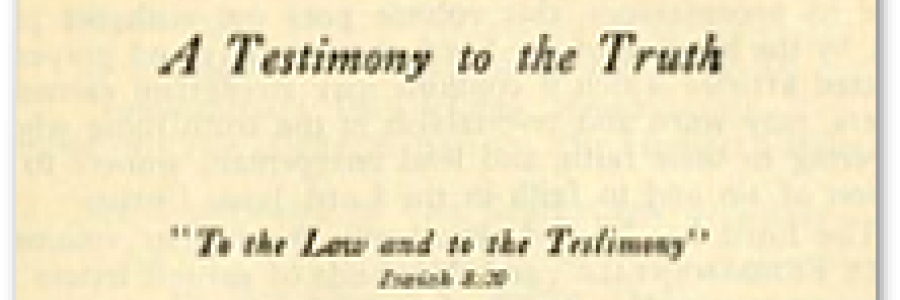Apologetics & Your Kids: Part 6 - Do Facts Speak for Themselves?
Read the series so far.
Facing the Evidence
I want to move forward a bit now to the subject of evidence. Probably many of you have heard the old dictum that scientists “follow the evidence wherever it leads.” Often scientists themselves promote this idea, and others catch on and parrot it. It sounds very dignified—almost pious. And, as philosophers of science like Thomas Kuhn and Michael Polanyi have shown, it is almost totally false.
Several years ago, a well known, oft-published physicist named Robert V. Gentry published a book entitled Creation’s Tiny Mystery, which cataloged his research on Polonium 218 radiohalos. The book makes fascinating reading, and it has never been gainsaid. All the same, Gentry’s researched has been shunted to the side by evolutionists because, well, it provides compelling data for the assertion that the earth is young.
Discussion
Apologetics & Your Kids: Part 4 - Avoiding Lazy Thinking
Read the series so far.
Last time I drew attention to some fallacious ideas which circulate on the airwaves and in popular culture. There are many more. In fact, even Christians have manufactured some pretty misleading mottoes and aphorisms which they use as watchwords instead of Scripture. Perhaps I’ll come back to that later, but right now I want to press on with the subject of worldviews.
As we have seen, a worldview is essentially an interpretation and outlook on life and its meaning. This outlook often lies behind the basic beliefs of people, although it must be added that people very often let their worldviews go unexamined. Let’s illustrate this with an example:
Many people will go to well known burger franchises and buy a cheeseburger even while knowing the ingredients are less than healthful. It’s the same with chicken nuggets, which are often made from gizzards and other unmentionables. If we gave critical thought to what we’re eating perhaps we would go for something else? In a similar way, if people tried a bit of critical reflection on their underlying beliefs, perhaps many of them would realize that these worldviews fail to provide healthy support for day to day experience or the societal values they deem important.
Discussion
Apologetics & Your Kids: Part 3 - God, Man & the World
Last time we looked at the importance of commending a biblical worldview to our children. If we can communicate that, then we have given them a solid frame of reference from which they can comprehend the world about them and make decisions about which directions to take in it. That is a valuable gift; and it is one that will be increasingly needed in the years ahead.
The Wisdom of the World Versus True Wisdom (1 Cor. 3:19)
I said last time that we would begin to see how the right worldview helps us do this. Let me start by listing again those pat catch-phrases which are frequently met with in the world:
Discussion
Apologetics and Your Kids: Part 1 - The Price of Truth
We have all read the statistics of young people who flee the Faith in which they have been reared soon after hitting college. There is more than one reason for this defection. The first and most obvious issue is probably the state of the heart. Is this individual actually saved? I’m not asking, “did they think they were saved?” I’m asking “were they saved?”
Now, before someone calls me on stating the obvious, or what is worse, on relying on the easy explanation, let me make a personal observation. This shall also act as my baseline:
In my experience most churches and most Christian parents do not teach the Christian Faith in a way that supports Godward faith in the world we are called to live in. And the major reason for this is a general disinterest in or else fear of doing apologetics.
Discussion
Did Saul Kill Himself or Was It an Amalekite?
Body
“Now before I attempt to unravel this supposed mess, let me give you a couple of principles for dealing with these contradictions.”
Discussion
Millennial Dawn: A Counterfeit of Christianity
CHAPTER VIII MILLENNIAL DAWN A COUNTERFEIT OF CHRISTIANITY
BY PROFESSOR WILLIAM G. MOOREHEAD, D. D., UNITED PRESBYTERIAN THEOLOGICAL SEMINARY, XENIA, OHIO
Six rather bulky volumes, comprising in all some 2,000 pages, are published by the “Watch Tower and Tract Society” of Brooklyn, N. Y. The author of this work is Mr. Charles T. Russell. Formerly his publications issued from “Zion’s Watch Tower”, Pittsburgh, Pa. They then bore the somewhat ostentatious title, “Millennial Dawn,” (1886). The volumes now bear the more modest inscription, “Studies in the Scriptures”, (1911). Why the change in the title is made can only be conjectured. Some rather severe criticism and strictures of the views advocated in these books have brought Millennial Dawn into disrepute in the minds of many people, and accordingly we think the former title has been dropped and the later and less objectional one substituted for it. Some color is given to this conjecture by the fact that certain evangelical terms are applied to the movement of which Mr. Russell is the head, as, e. g., “People’s Pulpit of Brooklyn”, “International Bible Students’ League”, “Brooklyn Tabernacle”, “Bible House and Tract Society”, (Our Hope, Feb., 1911). The later title and the various names now freely used tend to allay suspicion and to commend the propaganda of Mr. Russell and his followers to the Christian public.
Discussion
Defending the Faith - The Problem of Human Nature
From Voice, Jan/Feb 2015. Used by permission. (Read Part 1.)
Believers best defend the faith by turning the Bible loose through careful, accurate and patient teaching. Ultimately this becomes an issue of biblical anthropology: how do you view man? Is he able to fully comprehend and judge facts as if The Fall (Genesis 3) had no affect upon him?








Discussion